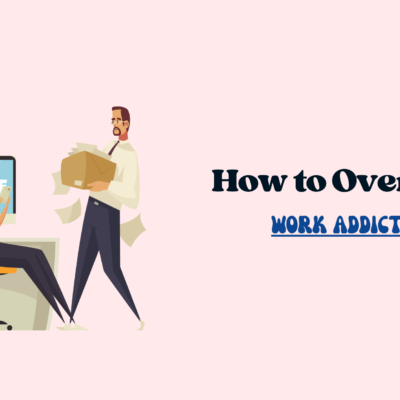How Can We Overcome Work Addiction: Work addiction, also known as workaholism, is characterized by an extreme and uncontrollable urge to work, usually at the expense of other areas of life such as health, relationships, and relaxation activities. While dedication and loyalty to one’s work are respected traits, work addiction includes a compulsive need to work that goes beyond normal job expectations and interrupts overall well-being.
Also Read:
- Benefits of Working From Home.
- Dealing With Stress and Anxiety at Work?- Here’s How to Handle.
- Tips For Managing Burnout At Work.
Common Signs of Work Addiction
Obsessive Thoughts About Work
Continuously thinking about work-related tasks, deadlines, and projects, even during non-working hours.
Difficulty Disconnecting from Work
Feeling worried or guilty when not working, and finding it difficult to take breaks or vacations.
Ignoring Personal Health
Ignoring physical and mental health needs, such as skipping meals, sacrificing sleep, or neglecting exercise.
Weak Relationships
Spending less time with family and friends, and experiencing conflicts or misunderstandings due to work-related preferences.
Reduced Productivity
Paradoxically, work addicts may experience diminishing returns on their productivity despite working excessively, leading to burnout and frustration.
Loss of Enjoyment in Other Activities
Losing interest in hobbies, socializing, or leisure activities that were once enjoyable, as work becomes the only focus of attention.
Denial or Rationalization
Minimizing the impact of work addiction or rationalizing excessive work habits as required for success or financial security.
Effects of Work Addiction on a Person:
Physical Health
Chronic stress, sleep deprivation, and ignoring self-care can lead to physical health problems such as tiredness, headaches, digestive issues, and increased exposure to illness.
Mental Well-being
Constant work-related stress and burnout can contribute to anxiety, depression, and other mental health disorders, affecting overall emotional stability and quality of life.
Relationships
Neglecting personal relationships in favor of work can weaken family bonds, friendships, and romantic partnerships, leading to feelings of aloneness and disconnection.
Career Burnout
Excessive work demands without enough rest can result in burnout, indicated by emotional exhaustion, cynicism, and decreased professional effectiveness.
Reduced Creativity and Innovation
Over-reliance on work can suppress creativity and innovation, as people may become trapped in repetitious patterns of thinking and problem-solving.
Reduced Quality of Life
Ultimately, work addiction can lead to a reduced quality of life, as people sacrifice their well-being, relationships, and relaxation time in search of career success.
How Can We Overcome Work Addiction:
Recognize and Acknowledge the Problem
The first step in overcoming work addiction is identifying and acknowledging the problem. Take an honest look at your work habits and evaluate whether your relationship with work is healthy or turning towards addiction.
Be willing to face any denial or rationalizations and identify the impact of work addiction on your well-being and relationships.
Set Boundaries and Prioritize Self-Care
Set clear boundaries between work and personal life to stop work from encroaching on other areas of your life. Set specific work hours, fix time for breaks and relaxation activities, and prioritize self-care practices such as exercise, relaxation, and socializing. Remember that taking care of your physical and mental health is important for long-term well-being and productivity.
Practice Mindfulness
Practice mindfulness in your daily life to balance the tendency to ruminate about work-related stressors. Practice mindfulness meditation, deep breathing exercises, or yoga to put yourself in the present moment and relieve anxiety and tension.
By growing awareness and acceptance of your thoughts and emotions, you can ease the grip of work addiction and promote a greater sense of balance and stability.
Set Healthy Coping Mechanisms
Identify healthy managing mechanisms to handle stress and anxiety without resorting to extreme work. Explore activities that bring you joy and relaxation, such as spending time in nature, engaging in creative hobbies, or practicing hobbies you enjoy.
Develop a toolkit of managing strategies, including journaling, talking to a trusted friend or therapist, or seeking support from a support group or counselor.
Have Meaningful Relationships
Prioritize nurturing meaningful relationships with family, friends, and loved ones, as they give important support and perspective outside of work. Make time for quality interactions and shared experiences that support your social connections and improve your life beyond the confines of work. Remember that developing strong relationships is important for overall happiness and well-being.
Practice Time Management
Set effective time management and prioritization skills to optimize productivity and stop work from consuming all your time and energy. Recognize your most important tasks and give time for attentive work, breaks, and relaxation.
Learn to delegate tasks when necessary and say no to additional responsibilities that exceed your capacity.
Seek Professional Help (if Needed)
If you find it difficult to overcome work addiction on your own, don’t hesitate to seek professional help from a therapist, counselor, or mental health professional. Therapy can give valuable support, insights, and techniques for handling work-related stress, setting boundaries, and developing a healthier relationship with work.
Remember that asking for help is a sign of strength, not weakness, and also it can lead to growth.
At The End
Overcoming work addiction needs a conscious effort to prioritize self-care, set boundaries, and cultivate a healthier relationship with work. By following the above-mentioned points you can break free from the cycle of work addiction and create a more balanced and fulfilling life.
Remember that true success and fulfillment come from encouraging all parts of your well-being, including physical, mental, emotional, and relational health.







